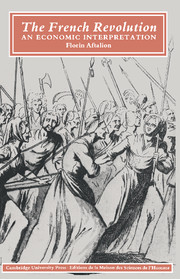Book contents
- Frontmatter
- Contents
- List of figures
- Chronology
- Acknowledgements
- Introduction
- 1 The fiscal crisis
- 2 The French economy at the end of the ‘Ancien Régime’
- 3 1789
- 4 The ‘assignats’
- 5 The finances of the Constituent Assembly
- 6 The rising cost of living, anarchy and war
- 7 The seizure of power by the Mountain
- 8 Economic dictatorship
- 9 ‘Dirigisme’ in retreat
- 10 The French Revolution: economic considerations
- Appendices
- Notes
- Select guide to further reading
- Index
- Frontmatter
- Contents
- List of figures
- Chronology
- Acknowledgements
- Introduction
- 1 The fiscal crisis
- 2 The French economy at the end of the ‘Ancien Régime’
- 3 1789
- 4 The ‘assignats’
- 5 The finances of the Constituent Assembly
- 6 The rising cost of living, anarchy and war
- 7 The seizure of power by the Mountain
- 8 Economic dictatorship
- 9 ‘Dirigisme’ in retreat
- 10 The French Revolution: economic considerations
- Appendices
- Notes
- Select guide to further reading
- Index
Summary
A few years ago, when I was teaching at New York University, I acquired the habit of browsing in a modest bookshop which has since moved but was then located a little to one side of Greenwich Village, where I was then living. ‘Laissez Faire Books’, as its name would lead one to expect, was wholly devoted to the sale of liberal books and journals. Its shelves contained all the classics of the genre, from Adam Smith to Friedrich von Hayek and Milton Friedman, but also science fiction authors with a libertarian outlook, such as Heinlein, and antipsychiatrists such as Thomas Szasz, together with any number of anarcho-capitalist texts published in the obscurer corners of the United States. One day I happened to notice a reprint of a short pamphlet entitled Fiat Money Inflation in France. Written around the turn of the last century, this pamphlet was meant to warn American politicians of the period of the dangers involved in the issue of paper money, which a number of them were proposing. The assignats episode of the French Revolution served as an illustration of this point. The author of the pamphlet also gave an account of the debates over the creation of the assignats and showed both the economic consequences (inflation and famine) and the political consequences (outbidding and the elimination of the main protagonists).
- Type
- Chapter
- Information
- The French RevolutionAn Economic Interpretation, pp. 1 - 10Publisher: Cambridge University PressPrint publication year: 1990



